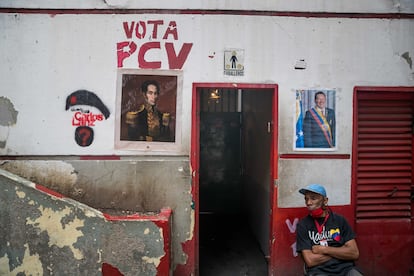The fallout between Venezuela’s communist party and the Maduro regime
Allies since Hugo Chávez was elected in 1999, the relationship has always been fragile

The Maduro regime’s relationship with one of its traditional allies – the Communist Party of Venezuela (PCV) – has sunk to a new low. Their differences, which until recently seemed tolerable, have grown more acrimonious recently. Communist leaders increasingly support opposition labor unions demanding better wages and have loudly denounced the rampant corruption at top levels of the government, calling for an investigation that includes President Nicolás Maduro himself.
The PCV party has also called for an “independent” investigation into the death of Leoner Azuaje, former president of the state-owned cardboard factory, Cartones de Venezuela. Azuaje was jailed during Maduro’s recent anti-corruption purge and allegedly committed suicide in his cell a few days after being locked up.
The frequent clashes in the National Assembly between PCV representatives and the legislative leadership headed by Jorge Rodriguez have grown more heated recently. The PCV is against the president’s liberalization of the economy and has demanded a thorough investigation into top-level government corruption. Meanwhile, the United Socialist Party of Venezuela (PSUV), Venezuela’s ruling party since 2010, has accused the PCV of colluding with the opposition and the United States to subvert Hugo Chávez’s Bolivarian revolution. The PCV countered by claiming that its two representatives in the National Assembly have been denied the right to respond to these accusations on the Assembly floor.
A recent statement from the PCV politburo blames the increasingly tense relationship on “… the systematic breach of the PSUV-PCV Unity Agreement signed in April 2018, and the implementation of an aggressive, ultra-liberal program against the people.” The statement was referring to the government’s economic liberalization measures in response to the nation’s financial collapse.
PCV Secretary General Oscar Figuera says they have evidence of a plan by the Maduro administration to abolish the PCV through legal maneuvers used against other allies-turned-critics of the chavismo movement, such as the Patria Para Todos and Podemos parties. The PCV has accused Diosdado Cabello of spearheading the effort. Cabello is the first vice-president of the PSUV and the second most powerful figure in the party.
The PCV has been part of the Bolivarian revolution since Hugo Chávez was elected president in 1999. It banded together with Patria Para Todos, the Tupamaro Movement, and other minority leftist organizations to create an alliance with the PSUV called the Polo Patriótico, a political voting bloc established by Chávez to defeat the opposition.
The relationship between the PCV and the Chávez-Maduro administrations has survived several crises, usually related to its knee-jerk rejection of any threats against its independence. Venezuela’s oldest political party refused to merge with the various leftist movements that gave birth to the PSUV in 2006, despite Chávez’s personal appeal. These disagreements were amicably settled and the country’s communists have steadfastly supported Maduro in his economic decisions and efforts to neutralize the opposition. But for the last three years, cracks in the relationship have grown wider and deeper.
In late 2022, the PCV denounced the Maduro government in Havana (the holy city of the Latin American orthodox left) during the 22nd International Meeting of Communist and Workers’ Parties hosted by the Communist Party of Cuba. When he was given the floor, PCV politburo leader Héctor Rodríguez told a surprised audience, “Venezuela’s recent experience reveals the limits of progressivism. It has abandoned anti-imperialist policies of nationalizing strategic industries, confronting large landowners, and defending social and labor rights in favor of a neoliberal economic agenda of privatization, price liberalization, landowner capitulation, labor deregulation and the dismantling of social achievements.”
Sign up for our weekly newsletter to get more English-language news coverage from EL PAÍS USA Edition
Tu suscripción se está usando en otro dispositivo
¿Quieres añadir otro usuario a tu suscripción?
Si continúas leyendo en este dispositivo, no se podrá leer en el otro.
FlechaTu suscripción se está usando en otro dispositivo y solo puedes acceder a EL PAÍS desde un dispositivo a la vez.
Si quieres compartir tu cuenta, cambia tu suscripción a la modalidad Premium, así podrás añadir otro usuario. Cada uno accederá con su propia cuenta de email, lo que os permitirá personalizar vuestra experiencia en EL PAÍS.
¿Tienes una suscripción de empresa? Accede aquí para contratar más cuentas.
En el caso de no saber quién está usando tu cuenta, te recomendamos cambiar tu contraseña aquí.
Si decides continuar compartiendo tu cuenta, este mensaje se mostrará en tu dispositivo y en el de la otra persona que está usando tu cuenta de forma indefinida, afectando a tu experiencia de lectura. Puedes consultar aquí los términos y condiciones de la suscripción digital.








































